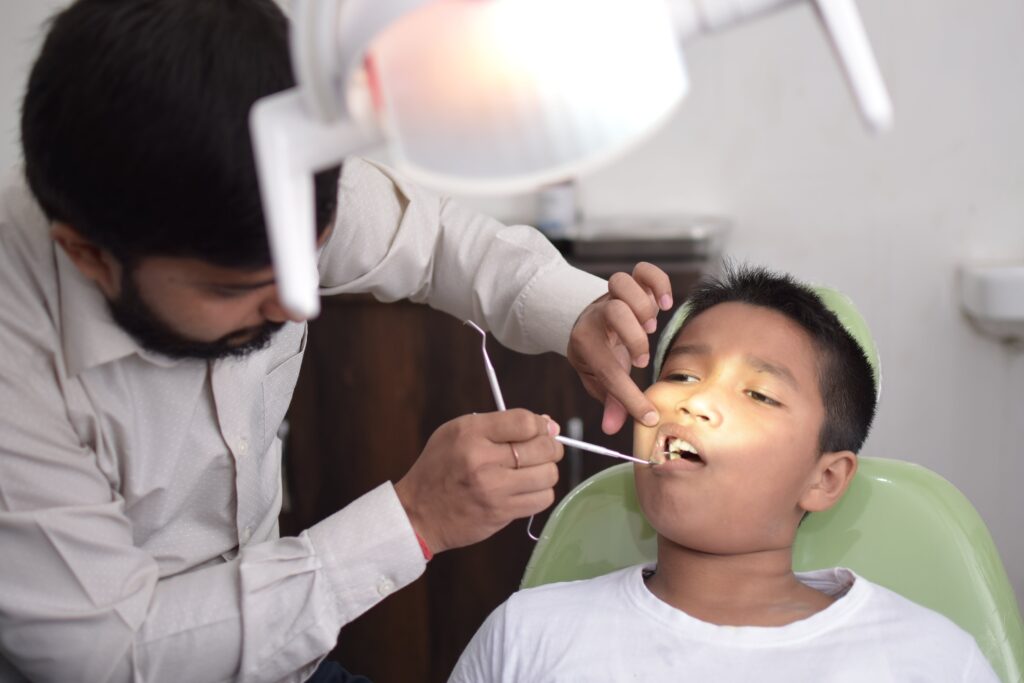
Receiving dental care can be a source of anxiety for many children, causing stress for both parents and little ones. However, fostering a positive attitude toward dental care from an early age is vital for maintaining good oral health. To make the dentist a less intimidating experience for your child, consider the following five practical tips to ease their anxiety and ensure a smooth dental visit.
- Start Early and Establish a Routine:
One of the most effective ways to alleviate dental anxiety in children is to start early and make dental visits a routine part of their lives. The American Academy of Pediatric Dentistry advises arranging a child’s inaugural dental appointment by their first birthday, establishing dental care as a familiar and consistent component of their healthcare regimen.
Choose an emergency pediatric dentist specializing in emergency care for children. These experts are well-trained to establish a child-friendly atmosphere, featuring vibrant decor, interactive toys, and an amiable staff. Introducing your child to the dental office environment and staff helps mitigate anxiety and cultivates positive associations with dental care.
- Use Positive Language and Reinforcement:
The language you use when discussing dental visits can significantly impact your child’s perception. Steer clear of words that may trigger fear, such as “pain,” “hurt,” or “shot.” Rather than that, employ positive and age-appropriate language to articulate the purpose of the visit.
Emphasize the significance of preserving healthy teeth and gums to achieve a beautiful smile and robust dental health. Emphasize the positive aspects of the dental visit, such as the opportunity to meet friendly dental professionals and learn about good oral hygiene habits.
Contemplate incorporating a motivational incentive structure for your child. Promise a small reward, like a special treat or extra playtime, following a successful dental visit. Positive reinforcement helps establish a connection between positive behavior and enjoyable outcomes, making future visits less daunting.
- Role Play at Home:
Role-playing at home is a highly effective method to familiarize your child with dental procedures in a safe and controlled environment. Set up a “pretend” dental office using toothbrushes, mirrors, a chair, and perhaps even a white coat for added fun.
Taking turns playing the roles of both dentist and patient allows your child to gradually acclimate to the idea of someone examining their mouth and using dental tools.
This engaging activity not only creates a sense of familiarity but also provides an excellent opportunity to explain each step of a dental visit, from the initial seat in the chair to the dentist checking their teeth. Encourage questions and openly address any concerns your child may express during the role-playing session, fostering an environment of trust and understanding.
- Bring Comfort Items:
Permitting your child to bring items of comfort to the dental appointment is a considerate approach to instill a sense of security. Whether it’s their favorite stuffed animal, a cozy blanket, or a special toy, having a familiar item can significantly ease anxiety during the dental visit.
It’s advisable to check with the dental office beforehand to ensure they are accommodating of such items. Many pediatric dental offices recognize the importance of making children feel comfortable and may even have a dedicated basket of toys or stuffed animals readily available to further contribute to a relaxed and positive atmosphere.
- Be a Calm and Supportive Presence:
Children often take cues from their parents, making it crucial to maintain a calm and supportive demeanor during dental visits. Avoid displaying any anxiety or fear you may have about the dentist, as this can influence your child’s perception and amplify their concerns.
Hold your child’s hand, offer continuous words of encouragement, and consistently praise their bravery throughout the visit. If your child senses that you trust the dental professionals and view the experience positively, they are more likely to feel at ease, fostering a sense of security and confidence in them during the appointment.
Conclusion
Taking steps to ease your child’s anxiety about the dentist is essential for establishing a positive attitude toward oral health. By starting early, using positive language, engaging in role-playing, bringing comfort items, and being a supportive presence, you can help create a positive dental experience for your child. These methods not only alleviate the intimidation associated with dental visits but also establish the groundwork for a lifetime of maintaining excellent oral hygiene habits.


